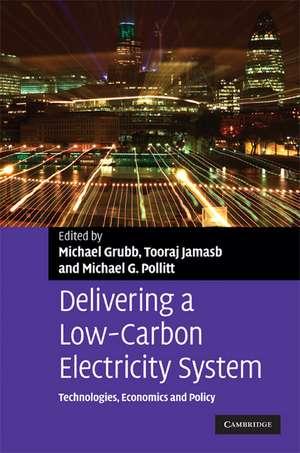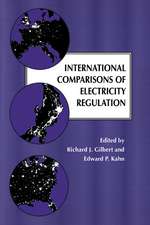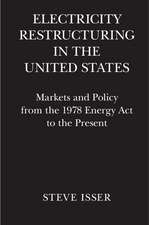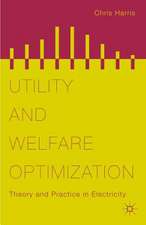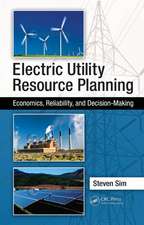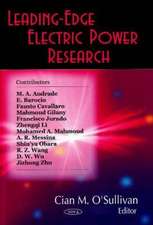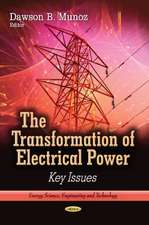Delivering a Low Carbon Electricity System: Technologies, Economics and Policy: Department of Applied Economics Occasional Papers, cartea 68
Editat de Michael Grubb, Tooraj Jamasb, Michael G. Pollitten Limba Engleză Hardback – 16 iul 2008
Preț: 902.33 lei
Preț vechi: 1049.21 lei
-14% Nou
Puncte Express: 1353
Preț estimativ în valută:
172.67€ • 184.63$ • 143.96£
172.67€ • 184.63$ • 143.96£
Carte tipărită la comandă
Livrare economică 18 aprilie-02 mai
Preluare comenzi: 021 569.72.76
Specificații
ISBN-13: 9780521888844
ISBN-10: 0521888840
Pagini: 536
Ilustrații: 86 b/w illus. 63 tables
Dimensiuni: 157 x 235 x 30 mm
Greutate: 0.95 kg
Editura: Cambridge University Press
Colecția Cambridge University Press
Seria Department of Applied Economics Occasional Papers
Locul publicării:Cambridge, United Kingdom
ISBN-10: 0521888840
Pagini: 536
Ilustrații: 86 b/w illus. 63 tables
Dimensiuni: 157 x 235 x 30 mm
Greutate: 0.95 kg
Editura: Cambridge University Press
Colecția Cambridge University Press
Seria Department of Applied Economics Occasional Papers
Locul publicării:Cambridge, United Kingdom
Cuprins
List of figures; List of tables; List of contributors; Foreword; Acknowledgments; 1. A low-carbon electricity sector for the UK: issues and options Michael Grubb, Tooraj Jamasb and Michael Pollitt; Part I. The Fundamentals: 2. Calculating the social cost of carbon Chris Hope and David Newbery; 3. Technologies for a low-carbon electricity system: an assessment of the UK's issues and options Tooraj Jamasb, William J. Nuttall, Michael Pollitt and Alexandra Maratou; 4. The benefits of fuel mix diversity Fabien A. Roques; 5. Variability and renewables Graham Sinden; 6. Implications of intermittency and transmission constraints for renewables deployment Karsten Neuhoff, Jim Cust and Kim Keats; Part II. Incentives and the Demand Side: Demand Side Management and System Requirements: 7. Electricity network investment and regulation for a low-carbon future Michael Pollitt and Janusz Bialek; 8. Domestic electricity consumption and demand side participation: opportunities and challenges for the UK power system Mark Bilton, Charlotte Ramsay, Matthew Leach, Hannah Devine-Wright, Patrick Devine-Wright and Daniel Kirschen; 9. Enhancing efficient use of electricity in the business and public sectors Michael Grubb, James Wilde and Steven Sorrell; Part III. Investment, Price and Innovation: 10. Will the market choose the right technologies? Karsten Neuhoff and Paul Twomey; 11. Pricing carbon for electricity generation: national and international dimensions Michael Grubb and David Newbery; 12. Learning curves for energy technology: a critical assessment Tooraj Jamasb and Jonathan Köhler; 13. Accelerating innovation and strategic deployment in UK electricity – applications to renewable energy Michael Grubb, Nadine Haj-Hasan and David Newbery; Part IV. Scenarios, Options and Public Attitudes: 14. Scenarios of the electricity industry in Great Britain in 2020: networks, generation and decarbonisation Ian Elders, Graham Ault, Graeme Burt, Ryan Tumilty, Jim McDonald and Jonathan Köhler; 15. Modelling the economic impact of low-carbon electricity Milton Yago, Jonathan P. Atkins, Keshab Bhattarai, Richard Green and Stephen Trotter; 16. Bridging technologies: can clean fossil offer a bridge to a sustainable energy future in the UK? David M. Reiner, Jon Gibbins and Sam Holloway; 17. Reconsidering public acceptance of Renewable Energy Technologies: a critical review Patrick Devine-Wright; 18. Concluding chapter Michael Grubb, Tooraj Jamasb and Michael Pollitt; Index.
Recenzii
'Atmospheric greenhouse gas stabilization goals can only be achieved by significantly reducing carbon emissions associated with the generation and use of electricity. This book, written by a group of distinguished economists, provides a comprehensive analysis of the options for doing so in a cost-effective and timely manner. The book's analysis provides an excellent framework to guide UK policies aimed at achieving its carbon reduction goals and can serve as an excellent policy model for other developed countries as well.' Paul L. Joskow, MIT Center for Energy and Environmental Policy Research
'As a path-breaking Climate Change Bill moves through the UK Parliament, it is clear that the electricity system in its widest sense - covering generation, infrastructure and consumers - has a critical role to play in meeting climate policy goals. The trick will be to do so while keeping down costs and ensuring secure supplies. The authors of this comprehensive text show how it can be done. An astute juggling of technology and economics, supported by informed analysis, is essential. This book should be on every energy policy makers reading list.' Jim Skea, UK Energy Research Centre
'As a path-breaking Climate Change Bill moves through the UK Parliament, it is clear that the electricity system in its widest sense - covering generation, infrastructure and consumers - has a critical role to play in meeting climate policy goals. The trick will be to do so while keeping down costs and ensuring secure supplies. The authors of this comprehensive text show how it can be done. An astute juggling of technology and economics, supported by informed analysis, is essential. This book should be on every energy policy makers reading list.' Jim Skea, UK Energy Research Centre
Descriere
A systematic analysis of the issues surrounding the creation of a low-carbon electricity sector.
